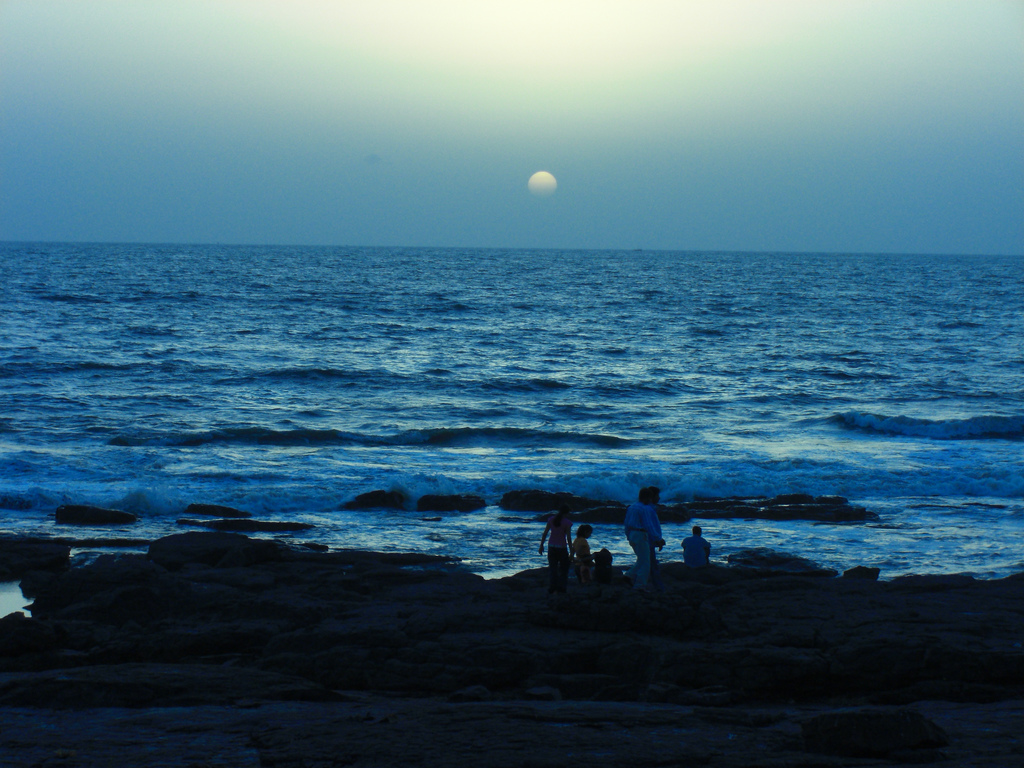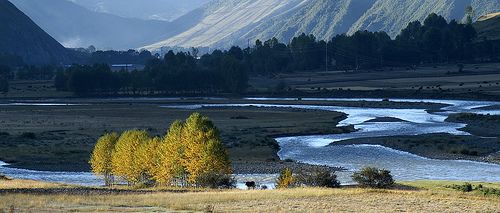China
A moonlit night on the Spring River (photo: Swami Stream)‘A Moonlit Night On The Spring River’: Music Is Poetry
By Jensen Liu“A Moonlit Night On the Spring River” is my favorite piece among the "Top 10 Chinese Classical Music" compositions. (ranking sixth). In 2008, it was used in the Opening Ceremony of Beijing 2008 Olympic games, when the actors recited the first few sentences from the poem reprinted below.
History of Different Names
Originally a Pipa solo by an unknown composer, "A Moonlit Night On the Spring River" has been popular in China since the Ming Dynasty. Its earliest score was first seen on handwritten copies around 1820 A.D. In 1895, it was collected in 13 Sets of Pipa Music Scores by Li Fangyuan, also known as "Pipa of Xunyang.” In 1929, Shen Haochu titled it "Flute & Drum Music at Dusk" in his Yangzheng Pipa Scores. Around 1925, two musicians in Shanghai rearranged it into a Chinese national orchestra, and titled it after a famous poem, "A Moonlit Night on the Spring River.”
After World War II, the great Chinese composer Peng Xiu-Wen rearranged this music into a Chinese national orchestra version. It soon became famous around China, and was also introduced abroad.
Music Is Poetry
As mentioned above, since 1925, this song has been known as "A Moonlit Night on the Spring River” after a Tang Dynasty-era poem by Zhang Ruoxu. Unlike infamous poets such as Li Bai, who had written thousands of good poems, Zhang Ruoxu has only two poems documented. However, this one is enough.The piece is famous for the beautiful scenery it evokes and for its feelings about passing human existence. The moon rises with the tide, the river sparkles in the moonlight. The poet is said to seek the meaning of life. He recognizes human frailty and transience by comparing the limits of human life with the eternity and constant renewal of nature.
"A Moonlit Night on the Spring River" by Zhang Ruoxu is known as "His Only Poem But Better than The Entire Tang Dynasty Poems.” Actually, Ruoxu has one other poem to his credit, the Yuefu poem, “River On a Spring Night.”
Reading this poem is to understand the charming beauty of "A Moonlit Night on the Spring River," as it integrates the essence of poetry, music and painting.
A Moonlit Night On The Spring River
[Tang Dynasty] Zhang RuoxuIn spring the river rises as high as the sea,
And with the river's rise the moon uprises bright.
She follows the rolling waves for ten thousand li,
And where the river flows, there overflows her light.
The river winds around the fragrant islet where
The blooming flowers in her light all look like snow.
You cannot tell her beams from hoar frost in the air,
Nor from white sand upon Farewell Beach below.No dust has stained the water blending with the skies;
A lonely wheel like moon shines brilliant far and wide.
Who by the riverside first saw the moon arise?
When did the moon first see a man by riverside?Ah, generations have come and pasted away;
From year to year the moons look alike, old and new.
We do not know tonight for whom she sheds her ray,
But hear the river say to its water adieu.
Away, away is sailing a single cloud white;
On Farewell Beach pine away maples green.Where is the wanderer sailing his boat tonight?
Who, pining away, on the moonlit rails would learn?
Alas! The moon is lingering over the tower;
It should have seen the dressing table of the fair.She rolls the curtain up and light comes in her bower;
She washes but can't wash away the moonbeams there.
She sees the moon, but her beloved is out of sight;
She'd follow it to shine on her beloved one's face.But message-bearing swans can't fly out of moonlight,
Nor can letter-sending fish leap out of their place.
Last night he dreamed that falling flowers would not stay.
Alas! He can't go home, although half spring has gone.The running water bearing spring will pass away;
The moon declining over the pool will sink anon.
The moon declining sinks into a heavy mist;
It's a long way between southern rivers and eastern seas.How many can go home by moonlight who are missed?
The sinking moon sheds yearning o'er riverside trees.
‘A Moonlit Night On the Spring River,’ a beautiful version with lyrics.(originally published at http://chinablog.cc)
Part II: ‘Kang-Ding Love Song’:
Stories Inside and Outside the Music
By Jensen Liu
‘Love Song of Kangding,’ performed by Song Zuying and Placido Domingo, with pianist Lang Lang, summer 2009, China Central Television (CCTR)“Kang Ding Love Song,” or “Love Song of Kangding,” is one of the most popular Chinese folk songs and is regarded as the first love song of modern China. Its simple melody and vivid rhythm are easy to remember and sing, and its lyrics speak of the timeless theme of love.
Behind this famous folk song lie two stories. One is inside the music—how it was written; the other is outside the music—how it became well-known.
Kang-Ding Love Song: The Story Inside
"Kang-Ding Love Song" was a folk song born written in the 1930s in Kangding (Sichuan) by a local musician named Li Yi-Ruo from Xuanhan (Sichuan). He wrote the song based on his own true romantic story: When he was attending college in Chengdu, Li fell in love with a classmate from Kangding. His parents did not agree on their relationship because her surname is also Li. He broke up with his parents and lost their financial support for schooling and living expenses. Thanks to help from Miss Li, Yi-Ruo was able to finish his college.
Influenced by feudal ethics, the relationship between Li Yi-Ruo and Miss Li of Kang-Ding did not have a happy ending. Yi-Ruo had traveled to Kang Ding with Miss Li. In order to commemorate this relationship, Yi-Ruo wrote this folk song titled "Horse riding high upon the mountain side.”
Li Yi-Ruo taught local people to sing this song and they loved it, calling it "The Galloping Horse Hill.” A fellow named Ou said Yi-Ruo taught him this song when he had dinner with Yi-Ruo. He thought the title was "Song of Kang-Ding Town.” And the lyric was different, including a sentence about "labor is good,” and the fellow’s name in the lyrics was Li instead of Zhang.
Kang-Ding Love Song: The Story Outside
This song gradually spread locally in the 1940s. In the mid-‘40s, a student from Fujian named Wu Wenji, then enrolled at the Qingmuguan National Music School in Chongqing, collected the song from Kangding soldiers. He gave the song to his teacher, Wu Zhengqian. Impressed, the teacher requested Jiang Dingxian (a famous musician at the Composition Department) rearrange it for voice.When Jiang Dingxian completed his arrangement, he also retitled it "Kangding Love Song.” Later, Wu Zhengqian sang the song for the first time at a school concert.
Jiang Dingxian recommended this song to the then popular singer Yu Yixuan. The same year in Nanjing, Yu Yixuan held a personal concert and sang the song publicly. It became part of her repertoire afterwards. She sang the song everywhere she went, from Nanjing to the Northwest, domestic and abroad, which made "Kangding Love Song" popular throughout the world, and recognized by the United Nations as one of the world’s top ten classical love songs.
Kangding Love SongHigh upon the mountain side
Floats a cloud so white
There lies peaceful Kang Ding town
Bathed in silver moonlightMoonlight shines bright
Over Kang Ding town, ohLovely maid with a smile so sweet
Li the wood cutter's daughter
Gheng the blacksmith eldest's son
Came through moonlight to court herMoonlight shines bright
Over Kang Ding town, oh
Came through moonlight to court herHe fell in love with her smile so sweet
And her pleasing ways, oh
She could cook and she could sew
Care for him all of his days, ohMoonlight shines bright
Over Kang Ding town, oh
Care for him all of his days, ohLovely maidens of the world
I cannot but love you
Gentlemen folk of the world
They cannot but woe youMoonlight shines bright
Over Kang Ding town, oh
They cannot but woe youMoonlight shines bright
Over Kang Ding town, oh
Founder/Publisher/Editor: David McGee
Contributing Editors: Billy Altman, Laura Fissinger, Christopher Hill, Derk Richardson
Logo Design: John Mendelsohn (www.johnmendelsohn.com)
Website Design: Kieran McGee (www.kieranmcgee.com)
Staff Photographers: Audrey Harrod (Louisville, KY; www.flickr.com/audreyharrod), Alicia Zappier (New York)
E-mail: thebluegrassspecial@gmail.com
Mailing Address: David McGee, 201 W. 85 St.—5B, New York, NY 10024





